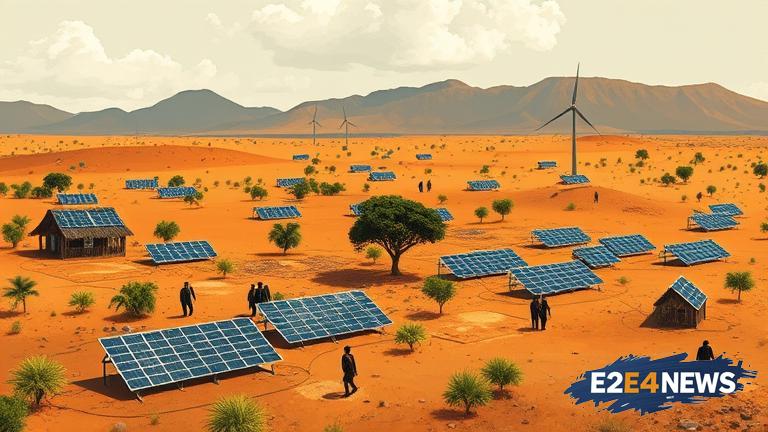The African continent is witnessing a significant shift towards renewable energy, driven by the need to address the pressing issues of energy access, energy security, and climate change. With a growing population and increasing economic activities, the demand for energy is on the rise, and renewable energy is emerging as a viable solution. Solar and wind power are the most prominent forms of renewable energy in Africa, with countries like South Africa, Egypt, and Morocco leading the way. The cost of renewable energy is decreasing, making it more competitive with fossil fuels, and governments are implementing policies to support the development of renewable energy projects. The African Union’s Agenda 2063 and the United Nations’ Sustainable Development Goals (SDGs) are also driving the adoption of renewable energy in Africa. Renewable energy can help reduce greenhouse gas emissions, improve air quality, and enhance energy security, which are critical for sustainable development. Moreover, renewable energy can create jobs, stimulate local economies, and improve the overall quality of life. However, the transition to renewable energy also poses challenges, including the need for significant investment, technology transfer, and capacity building. African countries are working to address these challenges through international cooperation, private sector engagement, and innovative financing mechanisms. The African Development Bank, the International Renewable Energy Agency (IRENA), and the European Union are among the key partners supporting the development of renewable energy in Africa. In addition, the private sector is playing a crucial role in driving the growth of renewable energy, with companies like Vestas, Siemens Gamesa, and Enel Green Power investing in African markets. The renewable energy sector is also attracting start-ups and small and medium-sized enterprises (SMEs), which are innovating and providing specialized services. Furthermore, renewable energy is enabling the development of mini-grids and off-grid systems, which are critical for electrifying rural and remote areas. The use of renewable energy is also promoting energy efficiency, with countries like Kenya and Tanzania implementing measures to reduce energy consumption. Moreover, renewable energy is supporting the development of electric vehicles, with countries like South Africa and Morocco investing in charging infrastructure. The growth of renewable energy is also driving innovation in energy storage, with companies like Tesla and LG Chem investing in battery technologies. However, the renewable energy sector in Africa still faces challenges, including policy and regulatory frameworks, grid integration, and financing. To address these challenges, African countries are working to strengthen their policy and regulatory frameworks, enhance grid infrastructure, and mobilize financing from public and private sources. The development of renewable energy in Africa is a complex and multifaceted issue, requiring a coordinated effort from governments, private sector entities, and civil society organizations. In conclusion, the renewable energy revolution in Africa is gaining momentum, driven by the need to address energy access, energy security, and climate change. With the right policies, technologies, and investments, Africa can transition to a low-carbon economy, driving sustainable development and improving the lives of its citizens.





